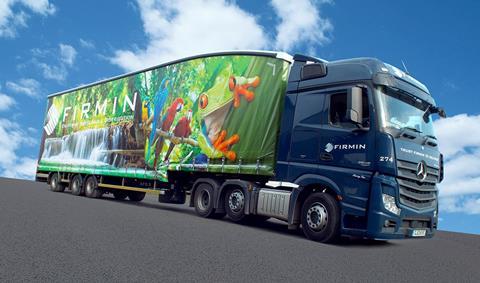
Operators will no longer be required to apply for a special licence to run longer semi-trailers of up to 18.55 metres - over two metres above the standard size - on Britain's roads from 31 May, the UK government has announced today (10 May).
The long-awaited move follows an 11-year road trial involving almost 3,000 longer semi-trailers (LSTs) and over 300 operators including major brands such as Greggs, Morrisons, Stobart, Royal Mail and Argos.
Announcing the change, DfT said giving the green light to the use of LSTs will deliver a £1.4bn boost for the UK’s economy, strengthen the supply chain, improve productivity and save 70,000 tonnes of carbon dioxide over 11 years.
The 11 year trial has shown that that the use of LSTs will see the same volume of goods moved using 8% fewer journeys than current trailers and take one standard-size trailer off the road for every 12 trips.
Under the new legislation, operators will no longer need to apply for a special licence to run a longer semi-trailer, as was the case during the trial period.
Vehicles which use LSTs will be subject to the same 44 tonne weight limit as those using standard trailers and operators will be legally required to ensure appropriate route plans and risk assessments are made to take the unique specifications of LSTs into account.
Whilst the trial showed that LSTs were involved in around 61% fewer personal injury collisions than conventional lorries, operators will also be required to put in place extra safety checks including driver training and scheduling, record keeping, training for transport managers and key staff, and loading of LSTs.
Roads Minister Richard Holden is visiting Greggs depot in Newcastle today to see the new longer lorries. The food retailer expects to deliver a 15% uptick in its regular deliveries using LSTs.
Holden said: "A strong, resilient supply chain is key to the Government’s efforts to grow the economy. That’s why we’re introducing longer semi-trailers to carry more goods in fewer journeys and ensure our shops, supermarkets and hospitals are always well stocked.
“These new vehicles will provide an almost £1.4bn boost to the haulage industry, reduce congestion, lower emissions and enhance the safety of UK roads.”
Read more
- Government gives green light to LSTs and announces trial of 48-tonne truck
- “What’s the hold up?” – call for more hauliers to back 25-metre artics road trial
- Operators could be allowed longer semi-trailers after successful trial
Gavin Kirk, Greggs supply chain director, added: "We welcome the introduction of longer semi-trailers (LSTs) into general use.
"Since 2013, Greggs has been operating LSTs from our National Distribution Centre in Newcastle. We were early adopters of the trial as we saw a significant efficiency benefits from the additional 15% capacity that they afforded us.
“We have converted 20% of our trailer fleet to LSTs, which was the maximum allowable under the trial, and these complement our fleet of double-deck trailers. Our drivers undertook additional training to use these trailers and we have monitored accidents, finding that they are as safe as our standard fleet.
“Due to the increased capacity, we have reduced our annual km travelled by 540,000, and saved 410 tonnes of carbon per year from LSTs, which supports our wider ESG agenda, The Greggs Pledge.”
Chris Yarsley, Logistics UK senior policy manageralso welcomed the introduction of LSTs, which he said "will increase the scope and scale of the goods which our industry is able to transport, increasing efficiencies and reducing the environmental impact of delivering for the UK’s economy."
He added: "Over the past few years of the trial, our members have proved that LSTs provide operators with a cost-efficient, environmentally prudent alternative to conventional vehicles and our members remain committed to rolling them out across the wider industry as soon as possible.”
Announcing the change, DfT said introducing LSTs is "an important, easy and affordable measure to continue to reduce CO2 emissions from the haulage industry without significant technological and infrastructure development."
The new legislation is part of the government’s 33 actions aimed at addressing the shortage of HGV drivers and boost recruitment and retention.
These include £52.5m to improve roadside facilities for lorry drivers, making 11,000 HGV driver training places available through Skills Bootcamps, boosting the number of HGV driver tests, and launching the Future of Freight plan to tackle the sector's skills shortages.













